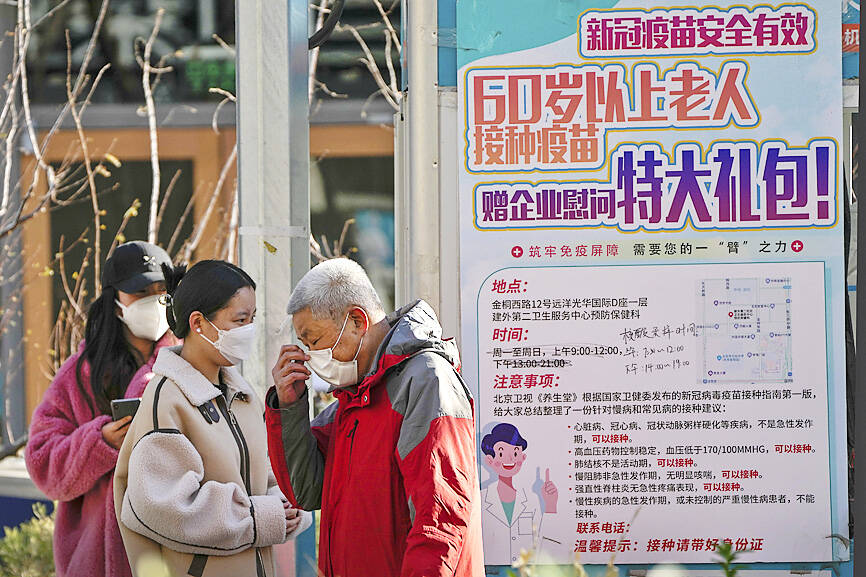Chinese President Xi Jinping (習近平) is unwilling to accept Western vaccines despite the challenges China is facing with COVID-19, and recent protests could affect his personal standing in the Chinese Communist Party, US Director of National Intelligence Avril Haines said on Saturday.
Although China’s daily COVID-19 cases are near all-time highs, some cities are taking steps to loosen testing and quarantine rules after Xi’s “zero COVID” policy triggered a sharp economic slowdown and public unrest.
Despite the social and economic impact of the virus, Xi “is unwilling to take a better vaccine from the West, and is instead relying on a vaccine in China that’s just not nearly as effective against Omicron,” Haines said at the annual Reagan National Defense Forum in California.

Photo: AP
“Seeing protests and the response to it is countering the narrative that he likes to put forward, which is that China is so much more effective at government,” Haines said.
“It’s, again, not something we see as being a threat to stability at this moment, or regime change or anything like that,” she said, adding that “how it develops will be important to Xi’s standing.”
China has not approved any foreign COVID-19 vaccines, opting for those produced domestically, which some studies have shown are not as effective as some foreign ones. That means easing virus prevention measures could come with big risks, experts said.
China had not asked the US for vaccines, the White House said earlier in the week.
One US official said there was “no expectation at present” that China would approve Western vaccines.
“It seems fairly far-fetched that China would green-light Western vaccines at this point. It’s a matter of national pride, and they’d have to swallow quite a bit of it if they went this route,” the official said.
Haines said that North Korea recognized that China was less likely to hold it accountable for what she said was Pyongyang’s “extraordinary” number of weapons tests this year.
Amid a record year for missile tests, North Korean leader Kim Jong-un said last week his country intends to have the world’s most powerful nuclear force.
China has no motivation to restrain any country, including North Korea, that generates problems for the US, US Indo-Pacific Command Commander Admiral John Aquilino said on a panel.
“I’d argue quite differently that it’s in their strategy to drive those problems,” Aquilino said.

James Watson — the Nobel laureate co-credited with the pivotal discovery of DNA’s double-helix structure, but whose career was later tainted by his repeated racist remarks — has died, his former lab said on Friday. He was 97. The eminent biologist died on Thursday in hospice care on Long Island in New York, announced the Cold Spring Harbor Laboratory, where he was based for much of his career. Watson became among the 20th century’s most storied scientists for his 1953 breakthrough discovery of the double helix with researcher partner Francis Crick. Along with Crick and Maurice Wilkins, he shared the

OUTRAGE: The former strongman was accused of corruption and responsibility for the killings of hundreds of thousands of political opponents during his time in office Indonesia yesterday awarded the title of national hero to late president Suharto, provoking outrage from rights groups who said the move was an attempt to whitewash decades of human rights abuses and corruption that took place during his 32 years in power. Suharto was a US ally during the Cold War who presided over decades of authoritarian rule, during which up to 1 million political opponents were killed, until he was toppled by protests in 1998. He was one of 10 people recognized by Indonesian President Prabowo Subianto in a televised ceremony held at the presidential palace in Jakarta to mark National

US President Donald Trump handed Hungarian Prime Minister Viktor Orban a one-year exemption from sanctions for buying Russian oil and gas after the close right-wing allies held a chummy White House meeting on Friday. Trump slapped sanctions on Moscow’s two largest oil companies last month after losing patience with Russian President Vladimir Putin over his refusal to end the nearly four-year-old invasion of Ukraine. However, while Trump has pushed other European countries to stop buying oil that he says funds Moscow’s war machine, Orban used his first trip to the White House since Trump’s return to power to push for

LANDMARK: After first meeting Trump in Riyadh in May, al-Sharaa’s visit to the White House today would be the first by a Syrian leader since the country’s independence Syrian President Ahmed al-Sharaa arrived in the US on Saturday for a landmark official visit, his country’s state news agency SANA reported, a day after Washington removed him from a terrorism blacklist. Sharaa, whose rebel forces ousted long-time former Syrian president Bashar al-Assad late last year, is due to meet US President Donald Trump at the White House today. It is the first such visit by a Syrian president since the country’s independence in 1946, according to analysts. The interim leader met Trump for the first time in Riyadh during the US president’s regional tour in May. US envoy to Syria Tom Barrack earlier